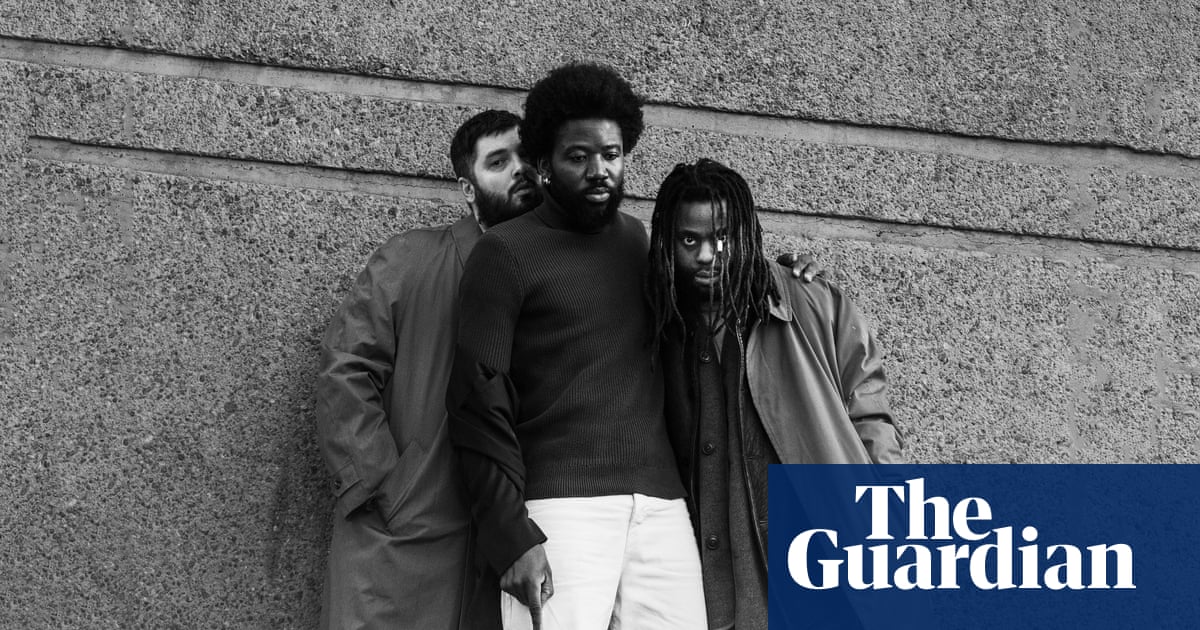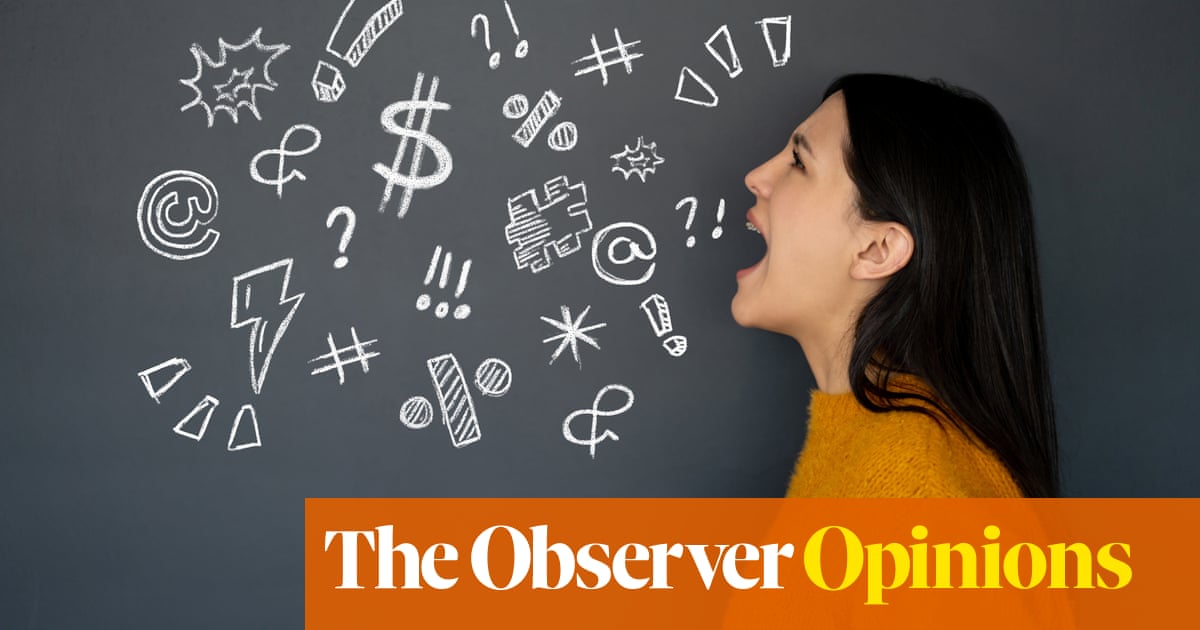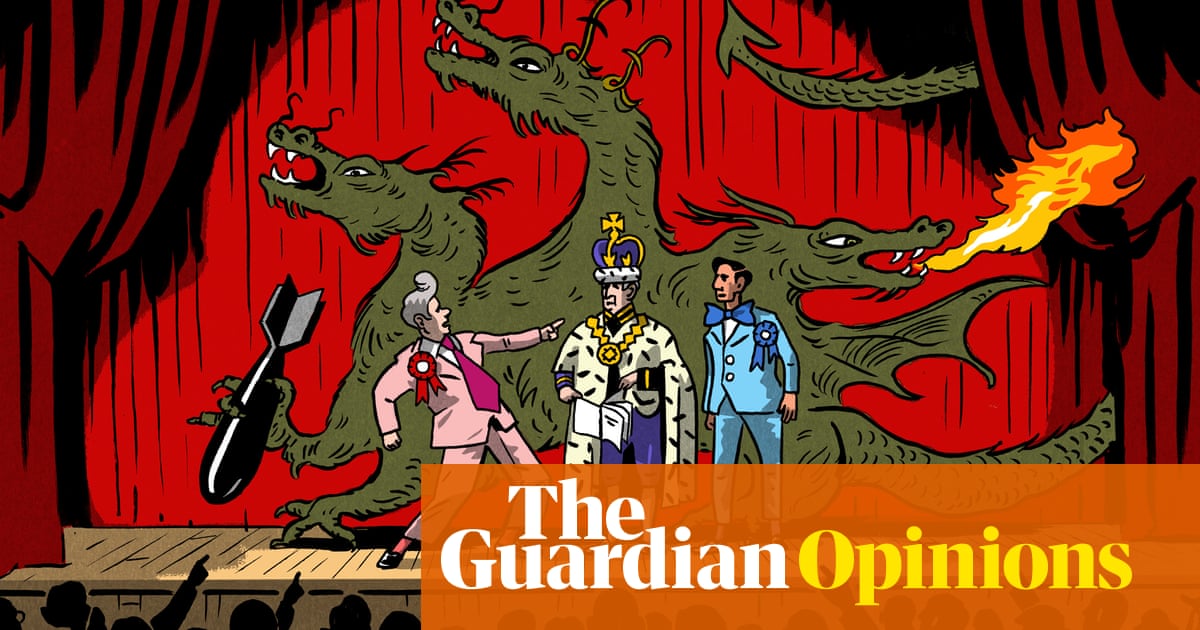
What would happen if bears sued humanity and fish left the sea? The author-illustrator of Tales from the Inner City on animal rights, veganism and winning the Kate Greenaway medal
In the days, weeks and months after the world went into lockdown, we marvelled as animals began to venture out into the habitats we had deserted. Schools of fish were suddenly visible in Venice’s cruise-ship-free waters. Flamingos flocked to Mumbai. A herd of fallow deer peacefully grazed on a London housing estate. Sheep visited a locked-down Welsh McDonald’s. “WE are the virus,” quickly became the most overrused meme of the pandemic.
Shaun Tan has been watching as the owls and possums in Melbourne’s suburbs have become more brazen, and feels troubled by it. For the last few years, he has been picking apart humanity’s complicated relationship with animals while writing and painting his book Tales from the Inner City, a beautiful and bleak anthology of stories, poems and artworks that pose unsettling questions about how we treat nonhuman life. Such as, what would we do if bears sued us for our crimes against the environment? What would we do if giant snails started performing slimy mating rituals all over our cities? What if the seas became so polluted that all the fish had to move into the sky?
Asking questions seems only to raise more for Tan, who has continued mulling this over in the two years since Tales was published, and even more so in lockdown, from the converted Jehovah’s Witness Kingdom Hall where he lives with his wife, two children and pet bird, Diego. “I wrote this book because I feel guilt, distress and anxiety when I look at animals,” he says. “Take Diego – he has a good life, we’ve had him for 20 years. But he should be in the woodlands of Brazil with other sun conures, not flying around a house with primates.”
But writing Tales has been good for him, he thinks, “because I feel a lot less certain than when I started. Now I realise how many philosophical questions there are that I have no answers for. And in its own way, it is deep to realise how little we know. I’d be suspicious if I claimed to know much about anything at all.”
Tan is perhaps most renowned as an artist, for the detailed pencil masterpieces seen in his wordless book The Arrival and his odd, bulbous inventions in The Lost Thing, the film adaptation of which won him an Academy award. As a writer, he is a strange beast: dark, whimsical and deeply moving. And as a person, he is unfailingly dry, and irreverent about his own successes in the way Australians can be. Explaining how Tales came to exist, he says: “I told my publisher, ‘Look here. This is a book. It’s finished. Do you want it or not?’” Fortunately, they said yes.
As Tan read more and more on food production and animal intelligence, he noticed Tales was becoming steadily darker. “The more I researched each animal, and the more I learned about how we treat them, the more depressing it got. Our relationship with nature is completely dysfunctional,” he says. The best description he can give is that it is “spiritually wrong”.
“It is hard to say if that is a consequence of contemporary life or if it has been [there] since we started picking up tools and cracking bones open, but the post-industrial relationship with animals is way more troubled than it’s ever been,” he says. “When I look at indigenous societies, the relationship [with animals] still feels complicated, but it is far more respectful. Even when slaughtering and eating them, they display a level of respect that we don’t show to animals in our society. We’re not being mean to animals – but there is evil in obliviousness.”
The problem, he feels, is that humans are chauvinists. Why else, he asks, do we privilege animals that can do things we can do, and ignore other forms of intelligence that we don’t have? He talks about a 2007 experiment where, after showing that chimps had better short-term memory than humans in a public demonstration, the lead researcher anticipated that some would dismiss the animals as “super-chimps”, adding: “Some humans are uncomfortable with the idea that beasts are cleverer than us, because we are supposed to be their intellectual superiors.”
“We are amazed at ourselves too much,” says Tan. “We bestow value on animals because we see ourselves in them. Dolphins, dogs, horses, pigs – we admire them in a narcissistic way. And our thought processes are deeply unfair and contradictory. We’ll eat a pig but pat a dog – that is very hard to rationalise.”
Tan’s Australian mother and father, a Chinese immigrant from Malaysia, married in 1967, six years before the White Australia policy was finally dismantled. Tan grew up in Hillarys, a “very Anglo” suburb outside Perth. His artistic talent was apparent from a young age; his first paid gig came when he was seven, when his father gave him 20 cents for adding a tree to an architectural sketch. Now, with an Oscar and a plethora of book awards under his belt, he has one more to add: the Kate Greenaway medal, which is, with its sister the Carnegie, the UK’s most prestigious children’s book prize. Tan is the first winner in its 56-year history who isn’t white.
“Hadn’t even thought about that,” he says, so he does. “Well, it’s good,” he decides. “But I am half-white, so I get the advantages of both. I understand what it is like to be a minority but I understand what it is like to be in the complacent majority as well.”
He has endured racism: “It was pretty minor but way more shocking than you’d expect. It’s not like being called an arsehole – that hurts your feelings. But when someone makes a comment about my being Asian, it sends me into a rage in a way that any personal insult won’t. Australia is a progressive country but also a pretty racist one. You have to just give it a little scratch, or a weak politician in power, and it all comes out.”
His story about bears encapsulates both the humour and horror in Tan’s voice. After a class action (Ursidae v Homo sapiens) is filed, humanity finds out that its legal system isn’t the only one: “There are as many systems as there are species … Human Law isn’t even very high on this hierarchy (apparently we are just below Walrus Law) and Bear Law actually takes precedence in most cases.” And the bears make a convincing case: “All the capital we had accrued throughout history was a collective figment of the human imagination: every asset, stock and dollar. We owned nothing. The bears asked us to relinquish our hold on all that never belonged to us in the first place.” Just look to human history for the outcome – it doesn’t end well for the bears.
Tan wrote the story after learning about animal law, an emerging field that recognises the rights of nonhuman animals and the environment. “There is a constant tension in human society between rationality and reality, that the same rules should apply to all people, and the fact that a lot of our systems become an instrument to carrying out someone’s will. The bear story is not that crazy. We have trouble tolerating our own kind; how on earth would we deal with other intelligent species? I hope we never meet extraterrestrial life – I don’t think we’re quite ready to not kill them.”
Writing Tales initially made Tan a vegetarian, but he winces when I ask if he’s stuck to it. “When I won the Kate Greenaway, I wondered if people would ask … Lockdown has made it a bit harder. This is a problem with the human condition: we find it harder to function at the level we would like to when there is so much going on. Even going to the supermarket and seeing empty shelves – I bet very few people decided to embark on their vegan adventure now. It is difficult to be the best person you can in these circumstances. But there are a bigger set of philosophical questions that I haven’t dealt with, and I think if I did, I’d come to the conclusion that veganism is the most logical thing to be doing at this point in history.”
He wants to stress that he wrote the book to sort out his own thoughts, not to make the readers vegan. Sermonising is “boring” to him, though he’s been accused of it before. Like Raymond Briggs and Oliver Jeffers, he creates picture books that are never firmly for adults or children, and he never shies away from making statements. Reading The Arrival, we know he is sympathetic to the plight of refugees; Cicada, in his own words, is about “the unspoken horrors of corporate white-collar enslavement … or is it?”. He is aware that his politics are visible, though he squirms at the idea. “I do try to withhold it as much as possible. Though, when people criticise my books for being political, that’s the only time I feel they’ve interpreted them too narrowly. I don’t want the reader to speculate about what I am thinking, but what they are thinking.”
While his book was written for himself, it is about all of us, our loneliness at the top of the chain. “We’re so busy talking to ourselves, in a language of our own construction and pleasing ourselves with our own ideas, that we aren’t seeing things we should be seeing,” he says. It is a heavy thought, but he likes to remind himself of something his wife sometimes observes: “Perhaps these are the dark ages. Every age thinks they are the enlightened ones but we are the barbaric times in someone else’s past. And that bothers me, but it is also inspiring because things can always be better. If someone is reading Tales in 500 years, I hope they think, ‘He wasn’t quite there – but he was going in the right direction.’”












